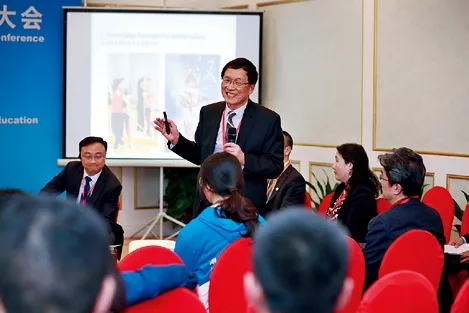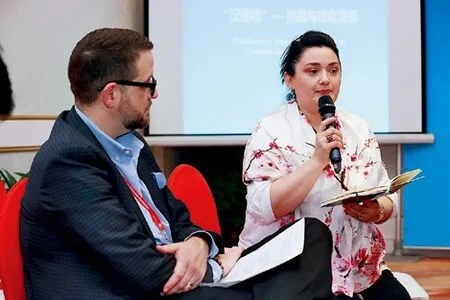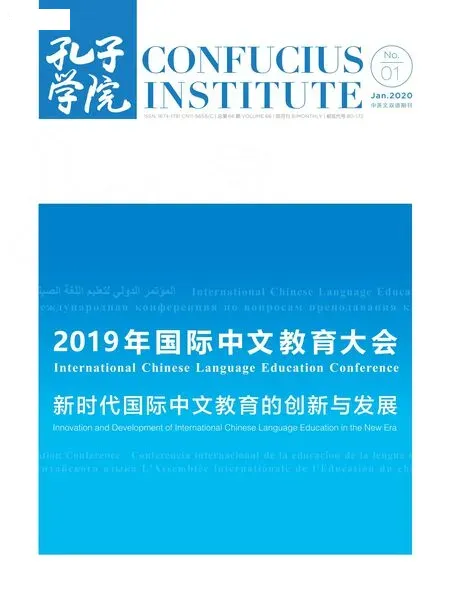中文教育品牌建设
来自中国、美国、俄罗斯、英国、澳大利亚、加拿大、意大利、德国、波兰、乌克兰等国的33 位发言人进行了深入探讨,现场观众累计超过320 人。
工作坊1. “汉语桥”项目的优化发展

来自美国孔院的两位外方院长陈祖言和张永龄分享了各自学员培养和推选汉语桥比赛选手的经验,指出“汉语桥”大、中学生中文比赛有效地促进孔子学院的汉语教学,开拓了选手的国际视野、培养了全球思维、进一步激发了学生的学习兴趣,为促进中外各领域交流储备了新一代人才。
湖南电视台制片人刘建立认为,“汉语桥”比赛结合电视媒介,实现了寓教于情、寓教于景、寓教于乐,搭建了世界青年友好交流的平台。2013 年总冠军澳大利亚的贝乐泰,参赛后在纽约联合国总部用中文表达了多元文化对世界与个人重要性的主题演讲;2014 年总冠军巴西的施茉莉成为央视当年的巴西世界杯转播特别解说员。
孔子学院总部驻泰王国事务代表王会昌随即介绍了首批试点的“汉语桥”俱乐部泰国站的成立背景和即将开展的一系列线上线下活动。
工作坊2.新汉学计划的拓展与提升
美国内布拉斯加林肯大学前校长Harvey Perlman、佐治亚州立大学孔子学院外方院长Kimberly Griffin Henshaw、蒙古国立大学孔子学院中方院长朱军利在发言中均提到,新汉学计划拓宽了青年学者的学术视野,提升了专业人才的实践能力,加深了他们对全球化环境下的中国的理解,而这些对中国与各国之间的人文交流产生深远影响。Perlman 教授指出,中美法学对比的专项研修非常注重学术品质,融合中美各自学术传统,在师资匹配和课程设置上对学生具备很大的吸引力,参与学生不但获得知识和经验的提升,还可以获得法学院学分。这一项目得到了其他一些美国法学教授以及律师协会的认可。
四川大学副校长晏世经提到,新汉学项目的博士生多拥有世界一流大学的研究背景,通过他们带来的独特研究方法及视角,与国内导师团队和青年学者进行交流与碰撞,对提升整个学科的研究水平有很大的促进作用。
德国汉堡大学孔子学院外方院长康易清与中方院长李双志认为复旦大学与德国汉堡大学在新汉学支持下联合培养双学位博士,推动了两校科研交流和学术合作,提供了鼓励优秀青年学者跨界研究的模式,对培养具有国际化学术思维的人才具有积极作用。
北京外国语大学孔子学院工作处处长金利民谈到,青年领袖项目为世界不同领域的专业人才提供了学术与文化兼容的深度学习体验,且高效地促成了实质性的后续合作。北外承办的“意大利青年翻译家”项目已初步与外研社、商务印书馆等达成20 部书目的翻译合作意向。
老挝国立大学孔子学院外方副院长李建民以新汉学博士生身份表示,希望各高校能尽早明确博士生的毕业学术要求,同时对由于研究未完成而延期毕业的博士生给予关怀和指导。对此,金利民处长介绍了北京外国语大学新汉学博士生培养的整套支撑体系,包括开展专门的集体活动,培养学生的归属感;开设工作坊,为博士生提供中文论文写作的学术指导;积极推荐学生开展专业讲座和授课,鼓励他们学用结合、以教促学;加强学生的文化社会考察,深度了解中国。
工作坊3.各国中文教育品牌项目分享
加拿大埃德蒙顿孔子学院李伟主任介绍了埃德蒙顿公立教育局的K-12 中文双语沉浸式教学项目。英国UCL教育学院孔子学院外方执行院长朱晓茗和澳大利亚墨尔本大学孔院外方院长宫正分别介绍了由英国教育部和澳大利亚维多利亚州教育与培训部倡导,孔子学院积极参与的英国中文培优项目(MEP)和维州青年领袖项目。韩国的金振武院长介绍了韩国大教集团推出、彩虹孔子课堂采用的“全面式”中文教育模式。美国明德中文暑校白建华教授、约旦外方院长Dima Al-malahmeh、吉林大学张广翠处长分别介绍了各自所在学校推出的中文教育品牌项目。
经过讨论,发言嘉宾一致认为打造国际中文教育品牌项目过程中需要注意以下几点:
1.品牌意味着专业发展和质量保证
建立品牌项目的关键是要找准定位,注重根据受众需求做好做精项目内容建设;设定严格标准把好质量关;通过实践不断提高和改进服务专业水平,在发展过程中要坚持核心原则,警惕分散聚焦。
2.品牌项目需要持续创新,培育忠实的品牌受众群体
要重视与项目参与者的互动,打造归属感和荣誉感;了解在品牌项目已提供内容外受众所需要的服务,不断丰富和更新服务内容。
3.打造品牌项目需要资源集成
与会代表倡议以更加开放的心态,广泛建立合作,发挥政府、市场、教育机构、智库、文化艺术机构、NGO等各方力量,集结中外优势资源,建立广泛而多样的支持基础,共同打造品牌项目。倡导开展区域合作,充分联动,很多发言人提出了跨国、跨区域的合作方案,分享了资源共享、优势互补的经验方法。
此外,韩国大教彩虹孔子课堂外方院长金振武提出设立“汉字纪念日”倡议,建议在全球孔子学院、孔子课堂率先开展“汉字纪念日”活动,进一步促进中文教育在全世界的推广与普及。

工作坊4.中外双向文化交流
美国加州大学洛杉矶分校孔子学院外方院长简·苏珊Susan Jain 提到,应结合所在大学的资源和院系需求,积极打造电影和艺术项目。她重点介绍了愿景敦煌系列项目,以敦煌为主题,由敦煌元素扩展到环境保护和生态文明领域,用实践证明双向文化交流的无限可能。俄罗斯圣彼得堡大学孔子学院外方院长尤丽娅介绍了戏剧主题的系列项目,为中俄戏剧剧目和艺术家提供了交流演出和创作机会,在双方戏剧界深受认可。日本北陆大学孔子学院中方院长赵炜宏从青少年体育交流的角度,展现了篮球、乒乓球等孔院策划的中日青少年体育比赛和夏令营项目。
就“如何打造中外双向文化交流品牌项目”,尼日利亚纳姆迪·阿齐克韦大学校长Charles Okechukwu Esimone表示,可持续性的文化交流一定要是双向的,并提前策划,保证高质量的内容;同时强调以孔子学院为依托加强青年师生交流深度和频次的重要作用。约旦安曼TAG 孔子学院外方院长Mamoun Abu Al Sebaa 从企业的视角,提出需要更加开放地拓展合作伙伴关系,整合资源;同时,聘用专业人士策划和宣传项目,专门针对文化活动做传播和公关,使线上线下推广相结合,保证项目发展和目标群体验形成良性循环。
就“如何汇聚各方资源共同促进双向文化交流”,英国兰开夏中央大学孔子学院外方院长余斐霞提出,在文化交流品牌项目方面,要发挥孔子学院的平台作用,整合资源促成合作,而不是都由自身生产项目。同时指出,整合资源要关注共同的兴趣点和各自的优势,形成互补关系促成双赢结果。
美国瓦尔普莱索大学副校长Rick AmRhein 指出,充分了解孔院所在大学和当地资源是必要和易操作的方法,大学的使命之一含有对学生国际多元文化理解力的培养,这与孔院传播中国文化的使命是相关联的,这种契合正能助力双向文化交流项目的开展。开放包容的态度是各方资源合作的保证。
北京市文化和旅游局对外交流与合作处处长杨连霞介绍了“欢乐春节”“北京之夜”等文旅品牌项目,基于与多所孔子学院的已有合作,从资源方代表的角度充分肯定了孔子学院彰显的平台作用,以及彼此联动影响力倍增的潜力,愿意与孔子学院进一步合作。
33 speakers from 17 countries including the United States,Russia, the United Kingdom, Australia, Canada, Italy, Germany,Poland, etc.conducted an in-depth discussion, with more than 320 audiences.
Workshop 1. Optimized Development of the “Chinese Bridge” Project
Chen Zuyan and Zhang Yongling, two foreign directors of the Confucius Institute in the U.S., shared their experiences in training and selecting Chinese Bridge contestants. They also shared the post-match comments and experiences of outstanding players through videos and cases. They pointed out that the“Chinese Bridge” competition for college and secondary school students has effectively promoted Chinese language teaching in the Confucius Institute, opened up contestants’ international vision, cultivated global thinking, further stimulated their interest in learning, and reserved a new generation of talents for promoting exchanges in various fields between China and other countries.
Liu Jianli, Producer of Hunan TV Station believed that combining the “Chinese Bridge” competition with television media has realized the combination of education and emotion,education and scenery, as well as education and fun, which has set up a platform for friendly exchanges among young people in the world. Through this “bridge”, many foreign youngsters have realized their dreams, stepped onto the international stage,and become ambassadors of mutual exchanges between Chinese and foreign civilizations. In 2013, Australian champion Alistair Bayley expressed the theme speech on the importance of diverse culture to the world and individuals in Chinese at the United Nations Headquarters in New York after participating in the competition. In 2014, the champion of Brazil, Monica Cunha Da Silva,became CCTV’s special commentator for the broadcast of the World Cup in Brazil.
11月,正值盐山分院开业一周年,医院启动“医疗精准扶贫、共建健康盐山”公益活动,其中包括为盐山县50岁以上群众进行免费体检,做好疾病早防、早诊、早治,提高群众健康意识;为盐山县养老院老人、低保户、五保户就医实行医保报销、保险理赔后,个人承担部分再减免50%的优惠政策,等等。
Wang Huichang, the representative of the Confucius Institute Headquarters in Thailand, then introduced the background of the establishment of the first pilot “Chinese Bridge” club in Thailand and a series of online and offline activities.
Workshop 2. Expansion and Promotion of Confucius China Studies Program (CCSP)
Harvey Perlman, Former President of the University of Nebraska Lincoln in the U.S., Kimberly Griffin Henshaw, Foreign Director of the Confucius Institute at Georgia State University,and Zhu Junli, Chinese Director of the Confucius Institute at Mongolian National University, all mentioned in their speeches that the CCSP has broadened the vision of young scholars,enhanced practical ability of professional talents, and deepened their understanding of China in a globalized environment, which has far-reaching significance for cultural exchanges between China and other countries. Professor Perlman pointed out that special study of China-US legal comparison attaches great importance to academic quality, and integrates academic traditions of China and the US, which has great attraction to students in terms of teachers and curriculum setting. Students can not only gain knowledge and experience, but also obtain law school credits. This project has been approved by other American law professors and bar associations.
Vice President Yan Shijing shared Sichuan University’s experience in strictly screening the CCSP instructors, innovating the “Multi-College Linkage” talent training mode, and encouraging students to conduct interdisciplinary research by virtue of its unique research platform and advantageous subjects. In the future, it will also be used to promote a series of translation and research of ancient Chinese famous poems. Yan Shijing,Vice President of Sichuan University, mentioned that from the perspective of Chinese universities, doctoral students of the CCSP are of high level and standard, and most scholars have the research background of world-class universities. Through their unique research methods and perspectives, exchanges and collisions with domestic tutor teams and young scholars have greatly promoted the research level of the whole discipline.
Carsten Krause, Foreign Director of the Confucius Institute at the University of Hamburg in Germany, and Li Shuangzhi,the Chinese director, both agreed with the above views. They believed that Fudan University and the University of Hamburg jointly cultivated double-degree doctorates with support of the CCSP, which promoted scientific research exchanges and academic cooperation between the two universities, provided a model to encourage outstanding young scholars to conduct cross-border research, and played a positive role in cultivating talents with international academic thinking.
Jin Limin, Director of the Office of Confucius Institutes at Beijing Foreign Studies University, said that the Young Leaders Fellowship Program has provided professionals in different fields worldwide with an in-depth learning experience that is both academic and cultural compatible, which has effectively promoted substantive follow-up cooperation. In the Italian Young Translator project hosted by Beijing Foreign Studies University, many students have initially reached an intention to cooperate in the translation of 20 bibliographies with Foreign Language Teaching and Research Press and The Commercial Press through two weeks of research and in-depth exchanges with Chinese writers,translators, publishing houses and book exhibitions. The CCSP will support their development towards more professional translators.
Li Jianmin, Deputy Foreign Director of the Confucius Institute at the National University of Laos, and a doctoral student in the CCSP, hoped that all universities would clarify academic requirements for doctoral students’ graduation as soon as possible, strengthen communication between supervisors and doctoral students, especially academic supervision and guidance, and at the same time give care and guidance to doctoral students whose graduation is postponed due to unfinished research. In response,Jin Limin introduced the entire support system for the training of the CCSP doctoral students in Beijing Foreign Studies University, including special collective activities to cultivate students’sense of belonging; setting up workshops to provide academic guidance for doctoral students in writing Chinese papers; actively recommending students to give lectures and lessons, with a view to encourage them to combine learning with practice and promote learning through teaching; strengthening students’ cultural and social investigation so that they can have a deep understanding of China.

Workshop 3. Sharing of Chinese Education Branded Projects in Various Countries
Foreign Director of the Confucius Institute in Edmonton Canada Li Wei introduced the K -12 Chinese Bilingual Immersion Teaching Program of Edmonton Public Education Bureau.Zhu Xiaoming, the Foreign Executive Director, of Confucius Institute at UCL Institute of Education and Julia Gong, Foreign Director of the Confucius Institute at the University of Melbourne,introduced the Mandarin Excellence Programme (MEP) in U.K.and Victoria Young Leaders to China Programme, which were initiated by the British Ministry of Education and the Department of Education and Training Victoria, Australia, respectively, with active involvement of the Confucius Institute. Director Jin Zhenwu from South Korea, introduced the “Comprehensive Mode” of Chinese language education launched by Korean Dae Gyo Group and adopted by the Rainbow Confucius Classroom. Professor Bai Jianhua of Middlebury’s Summer Chinese Language School in the U.S., Foreign Director Dima Al-marahmeh, and Section Chief Zhang Guangcui respectively introduced the Chinese language education branded projects launched by their respective institutes.
1. Brand means professional development and quality guarantee
The key to building a branded project is to find the right position and focus on doing a good job based on the needs of the audience when developing the project content; and set strict standards to improve quality and professional service through practice. In the process of development, we should adhere to the core principles and avoid distractions.
2. Branded projects need continuous innovation and cultivate loyal audience
We shall pay attention to the interaction with project participants, create the sense of belonging and honor; learn about the services branded projects require besides what have been provided, and constantly enrich and update the service contents.
3. Building branded projects require resource integration
The delegates advocated to establish a more open-minded and broad-based cooperation to give play to the roles of government, markets, educational institutions, think-tanks, cultural and artistic institutions, NGOs and other parties; to gather Chinese and foreign advantages to establish a wide and diverse foundation and jointly built branded projects. Advocating regional cooperation and full linkage, many speakers put forward transnational and cross-regional cooperation programs, and shared experience and methods of sharing resource and complementing advantages.
In addition, Jin Zhenwu, Foreign Director of the Rainbow Confucius Classroom of the Korean Dae Gyo Group, put forward the initiative of setting up a Chinese Characters Memorial Day. He suggested organizing the Chinese Characters Memorial Day at global Confucius Institutes and Confucius Classrooms, to further accelerate the promotion and popularization of Chinese education all over the world.
Workshop 4. Two-Way Cultural Exchange Between China and Other Countries
Susan Jain, Foreign Director of the Confucius Institute at the University of California, Los Angeles, mentioned the Institute has combined the resources of the university and the needs of its faculties, actively created film and art projects, and emphasized on the projects of Dunhuang Vision. With Dunhuang as the theme, art exhibitions and group exchanges are conducted.Considering the extensibility of the brand, the Institute has extended from Dunhuang elements to environmental protection and ecological civilization, and proved the possibility of two-way cultural exchange with practice. Yulia Mylnikov, Foreign Director of the Confucius Institute at the University of St. Petersburg in Russia introduced that a series of drama-themed projects provide performance and creation opportunities for the exchange of Chinese and Russian plays and artists, which is well recognized in the drama circles of both sides. Zhao Weihong, Chinese Director of Confucius Institute at Hokuriku University in Japan, showed the Sino-Japanese youth sports competitions and summer camp events planned by the Confucius Institute, such as basketball and table tennis matches, from the perspective of teenager sports exchange.
Charles Okechukwu Esimone, Vice-chancellor of Nnamdi Azikiwe University, Nigeria, said, on “how to build a brand of two-way cultural exchange at home and abroad”, expressed that sustainable cultural exchanges must be two-way and planned in advance to ensure the high-quality content, and took the China-Nigeria exchanged project as an example. At the same time, it is important to strengthen the depth and frequency of communication between young teachers and students based on the Confucius Institute.
Mamoun Abu Al Sebaa, Foreign Director of the Confucius Institute at Amman TAG in Jordan, from an enterprise’s perspective, proposed the need to expand partnerships and integrate resources more openly. At the same time, professionals should be hired to plan and publicize projects specifically for cultural activities for communication and public relations. It is necessary to combine online and offline promotion to ensure a virtuous circle of project development and target group’s experience.
On “how to gather resources to promote two-way cultural exchanges?”, Yu Feixia, Foreign Director of the Confucius Institute at Central University of Lancashire in U.K., proposed that in terms of branded projects of cultural exchange, the Confucius Institute should play a role as platform and integrate resources to promote cooperation, instead of producing all projects by itself.Meanwhile, she pointed out that the integration of resources should focus on the common points of interest and their respective advantages, and formed a complementary relationship to promote win-win results.
Rick AmRhein, Vice President of the Valparaiso University in the U.S., pointed out that it is necessary and easy to understand the host university and local resources. One of the missions of the university is the cultivation of students’ international multicultural understanding, which is related to the mission of the Confucius Institute to spread Chinese culture. This kind of correspondence just helps to promote the development of two-way cultural exchange projects. An open and inclusive attitude is the guarantee of resource cooperation among all parties.
Yang Lianxia, Director of the Foreign Exchange and Cooperation Department of the Beijing Bureau of Culture and Tourism, introduced the “Happy Spring Festival”, “Beijing Night”and other cultural tourism branded projects. Based on the existing cooperation with many Confucius Institutes, she fully affirmed the Confucius Institute as a platform from the point of view of resource representatives and the potential to multiply the influence of each other. She is willing to further cooperate with the Confucius Institute. They were fully affirmed from the perspective of representatives of the resources. In view of the platform role demonstrated by the Confucius Institute and the potential of doubling the influence of mutual interaction, it is willing to cooperate further with the Confucius Institute.

